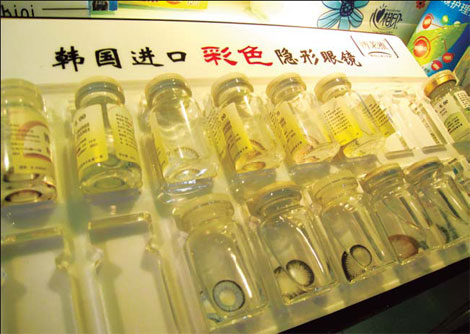Culture
Blinded by an urge for beauty
By Todd Balazovic and Wang Wen (China Daily)
Updated: 2010-07-14 10:07
 |
Large Medium Small |
 |
|
Colorful contacts are displayed at a shop in Zhaojia glasses market in Panjiayuan. [Wang Wen / China Daily] |
"When I saw my daughter at the airport, I noticed something was strange about her eyes. When I realized she was wearing circle lenses, I told her to take them out immediately," he said.
Still, despite the warnings, young Beijingers are flocking to shops to pick up the cosmetic lenses.
Yang Ting, 24, has been wearing non-prescription lenses 12 hours a day for the past six months. She said she started wearing the black lenses not to change the color of her eye, but to make them look bigger - something she said is more attractive.
"I like to do my makeup to make my eyes look bigger as well, it's beautiful," she said.
She said almost all of her friends wear black contacts as well, regardless of whether or not they need to wear corrective lenses.
Yang said she has felt the price for beauty, however. Though she used to wear her contacts every day, she has had to reduce the amount because of the discomfort they cause her eyes.
The unclear risks associated with the lenses have led them to be banned in the US, but many teenagers and young adults are still managing to find sources to help them get their foxy-eyed fix.
In Beijing, men also jump on the bandwagon. University student Lu Zhengwei said he tried wearing grey cosmetic contacts last year.
"I thought it was unique to have a pair of gray eyes. But I gave it up because my vision was damaged," Lu said, noting his Myopia got slightly worse after a half year of wear.
At the Zhaojia glasses market, where ads for the lenses can be seen on almost every wall, one shop owner, surnamed Han, said he noticed a vast increase in the number of circle lenses being purchased.
But for him and other vendors at the market, the lenses pose a burden.
"Most shop owners here don't like to carry them, we don't make much money on them," he said. But the shop owners continue to sell them because of the huge demand.
At Han's shop sits an entire shelf of South Korean brands that are selling for as little as 90 yuan ($12.80) per pair, with better-known brands going for as much as 218 yuan.
Customers can buy pre-determined prescription strength lenses, or simply buy lenses with no prescription, without the need for an eye exam, which adds to the potential danger.
Li said those that ignore the health risks and choose to wear circle lenses, are better off buying the products from a well-known company such as Bausch and Lomb or Johnson & Johnson.
"Big companies have money for research and development. They can develop safer products," he said.
"But small companies tend to do things cheaply based on old technology and the risks are increased."
Xiao Yang, a saleswoman from meitong.org, a popular website for the contacts, said though the contacts had been available for years, they recently had a boost in sales after Faye Wong, a famous Chinese singer, wore a pair of grey lenses while performing at the Spring Festival Gala.

Lu Yanyun, director of the contact lens center in Beijing's Tongren Hospital, said that the difference between a cheap product and an expensive product is night and day.
Companies sell more expensive lenses have reduced some of the risks by devising a way to cushion the colored portion of the circle lenses so that it doesn't come in direct contact with the eye.
She said those still willing to take the risk should ensure that contacts are certified and only buy them after a thorough eye examination from a professional optometrist.
Most importantly, she said, is to keep them clean while wearing them.
But for 25-year-old Shu Yi, who recently bought a pair of circle lenses and threw them away after wearing them five times, the trend is not worth the risk or the discomfort.
"It is so uncomfortable because the colorful contact lenses are thicker than normal ones," Shu said.
"And really, they don't look as beautiful as I initially thought they would."
Yao Jing and Yang Wanli contributed to this story.